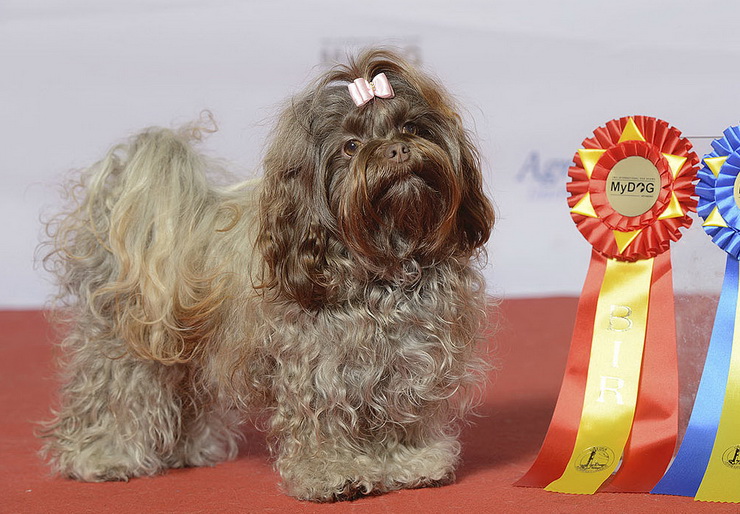Bolonkas relate to small Russian dog breeds of the Bichon type and include the Franzuskaya Bolonka ("French Bolonka") and the Russian Tsvetnaya Bolonka ("Colored Bolonka"). The Franzuskaya Bolonka is usually white, whereas the Russian Tsvetnaya Bolonka may be of various colors.
These little dogs (height 9.5 - 11.5 inches, weight 5.5 - 11 pounds) are nice and cute home pets and have become more and more popular outside their native country. Both of these small dog breeds are only waiting for their official international recognition, though the Russian Tsvetnaya Bolonka is already standardized in Germany and some other European countries.


The history of the Russian Tsvetnaya Bolonka is associated with the post-WWII situation in Russia. After the war, some Russian dog breeders in St-Petersburg were gathering and selecting the surviving Bolonkas and various little dogs of unknown origin for further breeding.
The breeding process, which was aimed at excluding the white color and developing the silkiness of the coat, resulted in the creation of the Russian Tsvetnaya Bolonka.
Today this Soviet dog breed is known for its soft, wavy to curly coat of amazing variety of colors (black, black and tan, brown, brown and tan, gray, red, fawn, crème, beige, orange, etc.). It is quite popular in Germany where they call it Bolonka Zwetna or Bunte Schoßhündchen.
You may also like:
The Franzuskaya Bolonka is, in fact, a variation of the Italian Bolognese dog. In the 18th century, it was brought to Russia from France and became very popular with the Russian aristocracy which gave it the name Franzuskaya (French) Bolonka (Bolognese).
After the Russian communist revolution in 1917, the Russian dog breeders became isolated from the outer world, and the further development of Bolognese dogs in Russia went its own way. (Photo Credit: Stefan Braun)
Bolonkas are full of character; they are friendly, loyal, and affectionate dogs. These small dog breeds are wary of strangers, but usually, become wonderful companions for children and senior family members. Known as generally sturdy and healthy breeds, Bolonkas sometimes suffer from common little dogs’ problems, including eye and dental issues. Their beautiful coat requires almost everyday attention and regular grooming.
Bolonkas are used to live indoors, though their lively nature demands some play and exercise. They want to stay with their masters all the time and hate to be left alone.
Russian Tsvetnaya Bolonka, Tsvetnaya Bolonka, Russian Coloured Bichon, Russkaya Tsvetnaya Bolonka, Bolonka Zvetna, Bunte Schoßhündchen, Bolonka Zwetna, Russian: Русская цветная болонка
Say it in Russian:
Franzuskaya Bolonka, French Bolonka, Bolonka Franzuska, Russian: Французская болонка
Say it in Russian:
Find a Russian dog name for your Bolonka puppy!
Learn some Russian dog commands!
We use cookies to offer you a better browsing experience, analyze site traffic, personalize content and ads.